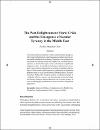The Post-Enlightenment Moral Crisis and the Emergence of Secular Tyranny in the Middle East
| Author | Chak, Farhan Mujahid |
| Available date | 2022-09-20T07:17:02Z |
| Publication Date | 2017 |
| Publication Name | American Journal of Islam and Society (AJIS) |
| Identifier | http://dx.doi.org/10.35632/ajis.v34i1.3047 |
| Citation | Chak, F. M. (2017). The Post-Enlightenment Moral Crisis and the Emergence of Secular Tyranny in the Middle East. American Journal of Islam and Society, 34(1), 49–79. https://doi.org/10.35632/ajis.v34i1.3047 |
| ISSN | 2690-3733 |
| Abstract | This article explores humanity’s ethical transformation during Europe’s post-Enlightenment era and assesses its impact upon the origins and development of secularism. Thereafter, it investigates how secularism was introduced into the Middle East, isolating that importation as directed through western colonialism or spellbound indigenous elites. Eventually, introducing secularism into the region’s socio-cultural milieu achieved nothing resembling what Europe or North America had experienced, particularly as regards the purported aims of social reconciliation, industrialization, and modernization. Without the European context, secularism emerged in a radically offensive manner, one that uprooted the local axiology and thereby leading to unprecedented levels of secular tyranny as well as entailing the justification of socio-economic and political oppression. |
| Language | en |
| Publisher | the International Institute of Islamic Thought (IIIT) |
| Subject | Islam and Politics Enlightenment the Middle East Secularism Fundamentalism Elites Tyranny Conflict |
| Type | Article |
| Pagination | 49-79 |
| Issue Number | 1 |
| Volume Number | 34 |
| ESSN | 2690-3741 |
Files in this item
This item appears in the following Collection(s)
-
Gulf Studies [137 items ]


